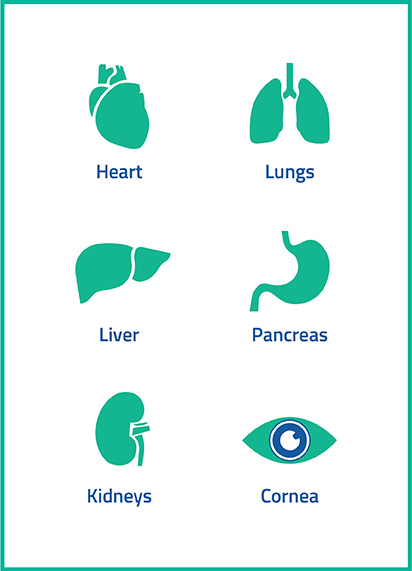
DID YOU KNOW?
In India, Organ Donation rate is the lowest in the world.
A single donor can save up to eight lives by organ donation and enhance up to 50 lives
by tissue donation.
>1 in a Million
People in India donate their organs.
500,000+
people need organ transplant every year.
1.5 to 2 lakh
Kidney transplants are required a year, while only about 8,000 transplants happen.
40 to 50 K
Liver transplants required a year, about 1,700-1,800 happen each year.
You can choose to donate some or all your organs.


Every year, lakhs of people die due to the non-availability of organs. All your vital organs like the kidneys, lungs, heart, liver, bone, and skin tissues can be donated. You are eligible to donate irrespective of your age, caste, religion, etc. Moreover, the process of donation is initiated only after your death, with the permission of your closest family members. When you pledge to donate, you give 8 people or more a chance at life.
a. Anyone above the age of 18 can donate organs by choice. Those below 18 require their legal guardians’/parents’ agreement.
b. Medically fit individuals, irrespective of age, caste, religion, etc. can be donors.
c. The donor's medical condition at the time of death will determine which organs can be donated for transplant or scientific research.
Kidneys, lungs, heart, liver, pancreas, eyes, small intestines, skin tissues, bone tissues, heart valves, and veins can be donated.
The 'Transplant of Human Organs Act' prohibits any commercial dealing in organs and makes it a punishable offence.
- The authorities of the hospital should be informed of the willingness for organ donation.
- A written consent is to be given by the lawful custodian of the body, in a prescribed form.
- A potential donor may have wished for organ donation during his/her lifetime.
This helps the family take a final decision and give consent.
Living organ donation: When a living person voluntarily donates an organ, as in kidney or liver transplants.
Cadaveric donation: When organs are donated upon a donor's death after they are pronounced brain dead, with the permission of the closest family members.
Those suffering from HIV/AIDS, active cancer, a compromised immune system, and other extreme conditions.
The organ donor's family is never charged for donating.
When you go to the hospital for treatment, doctors focus their priority on saving your life — not somebody else's. The doctor in charge of your care has nothing to do with transplantation. Besides, Organ donation can only be considered after brain death occurs.

